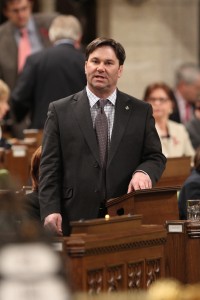NDP Trade Critic Don Davies (pictured) is asking the Harper government to give MPs the same access to the Trans-Pacific Partnership negotiating text as U.S. Members of Congress have. Meanwhile in Malaysia, the government is feeling increasing pressure from right- and left-wing opposition to be more forthcoming about what is being discussed behind closed doors. Even The Economist is worrying that unless the 12 negotiating countries involved in the TPP come clean, they risk alienating any possible public support for the deal when or if it is ever concluded.
“The TPP is a sweeping agreement covering issues that affect many areas of Canada’s economy and society — including several areas of policy that have never been subject to trade agreements before,” said Davies in an August 28 press release. “By keeping Parliament completely in the dark on negotiations the Conservatives also leave Canadians in the dark and, for an agreement of this magnitude that is abnormal and unacceptable.”
The NDP critic says if U.S. politicians can see the agreement as it looks to date, there’s no reason Canadian MPs shouldn’t be able to as well. It’s hard to disagree with that. Almost immediately, OpenMedia.ca issued a statement congratulating the NDP for its position.
“I am delighted to see that the Official Opposition is calling for much-needed greater transparency around these highly secretive talks,” said Steve Anderson, executive director of OpenMedia.ca, a network of people and organizations working to safeguard the possibilities of the open Internet and create an informed and participatory digital policy. “The NDP is joining hundreds of thousands of citizens taking part in campaigns like OurFairDeal.org, calling for more transparency. We cannot allow a small cabal of unaccountable bureaucrats and unelected lobbyists to cook up extreme new rules that could wreck Canada’s digital economy and undermine expression online.”
Internationally, calls for transparency are growing also. U.S. Congress would not have gotten access, even limited access, to the TPP text without a groundswell of public campaigns demanding it. In Malaysia, TPP secrecy risks destroying any popular or political support for the government’s participation in the negotiations.
Following a TPP ministerial meeting in Brunei last week, Malaysian Trade Minister Mustapa Mohamed wrote that he “drew attention [of other TPP countries] to the growing discomfort domestically arising from Malaysia’s participation in the TPP negotiations, the outreach activities that had been undertaken and the concerns raised by the various stakeholders, specifically on the issue of lack of transparency and disclosure of information on the texts being negotiated.” The minister added he “amplified these concerns during the bilateral meetings with my counterparts from New Zealand, Japan, Mexico, Canada, Singapore and U.S. and exchanged views on how best to take this forward.”
An August 24 article in The Economist explained that the government of Malaysian Prime Minister Najib Razak is “under fire from all sides” on this deal:
To Mr Najib’s left, Anwar Ibrahim, the opposition leader, sees it as an American effort “to impose its brand of economic model”. On his right, a former prime minister, Mahathir Mohamad, still influential in the ruling party, UMNO, also opposes it. Rules for public procurement under TPP might threaten the affirmative-action policies that favour the country’s ethnic-Malay majority.
Minister Mohamed adds to procurement — where Malaysia seeks a carve-out for its offsets to small and medium-sized companies as well as social enterprises — a list of other concerns his government has with certain chapters in the TPP:
I underscored that Malaysia had serious difficulties with the current [state-owned enterprises] proposal, which is seen to go beyond the stated objective of creating a level playing field and that it had serious implications to Malaysian SOEs. This concern on SOEs was also shared by some other TPP countries. On [intellectual property rights], I reiterated our strong position on the issue of access to affordable medicines. On the issue of environment, I reiterated our position to safeguard the States jurisdictions and that the environment and labour chapter should be based on a consultative approach to settle any disputes.
In that one paragraph we have more information about Malaysia’s position on the TPP than the Harper government has told us of Canada’s position in the past year. Requests by trade committee members for Canada’s cost-benefit assessment of the 12-country negotiation were ignored, possibly because it would prove how little the Canadian GDP would be affected by the TPP but more likely because the government hasn’t done any assessment at all. (Malaysia is only now performing its own, also because of widespread public pressure.)
There will be rallies in Toronto and Montreal today — Thursday, August 29 — to demand more from the Canadian and U.S. governments to end the excessive and unreasonable secrecy around the TPP negotiations. The rallies will both meet at noon outside U.S. consulates in those cities. More information here. It’s part of an international week of action happening while TPP negotiators continue to advance their private agenda behind closed doors in Brunei.
Following this 19th round of negotiations, things may go completely dark as TPP countries move to smaller, completely inaccessible inter-sessional discussions on specific chapters. There’s one happening right now in Ottawa, on the labour chapter. Others are slated for various TPP countries throughout September. The Council of Canadians and its allies in Canada and globally are committed to strengthening calls for total transparency — the public release of all TPP negotiating chapters — and a greater public and parliamentary role in developing trade and investment policy that benefits everyone, not just multinational corporations.



